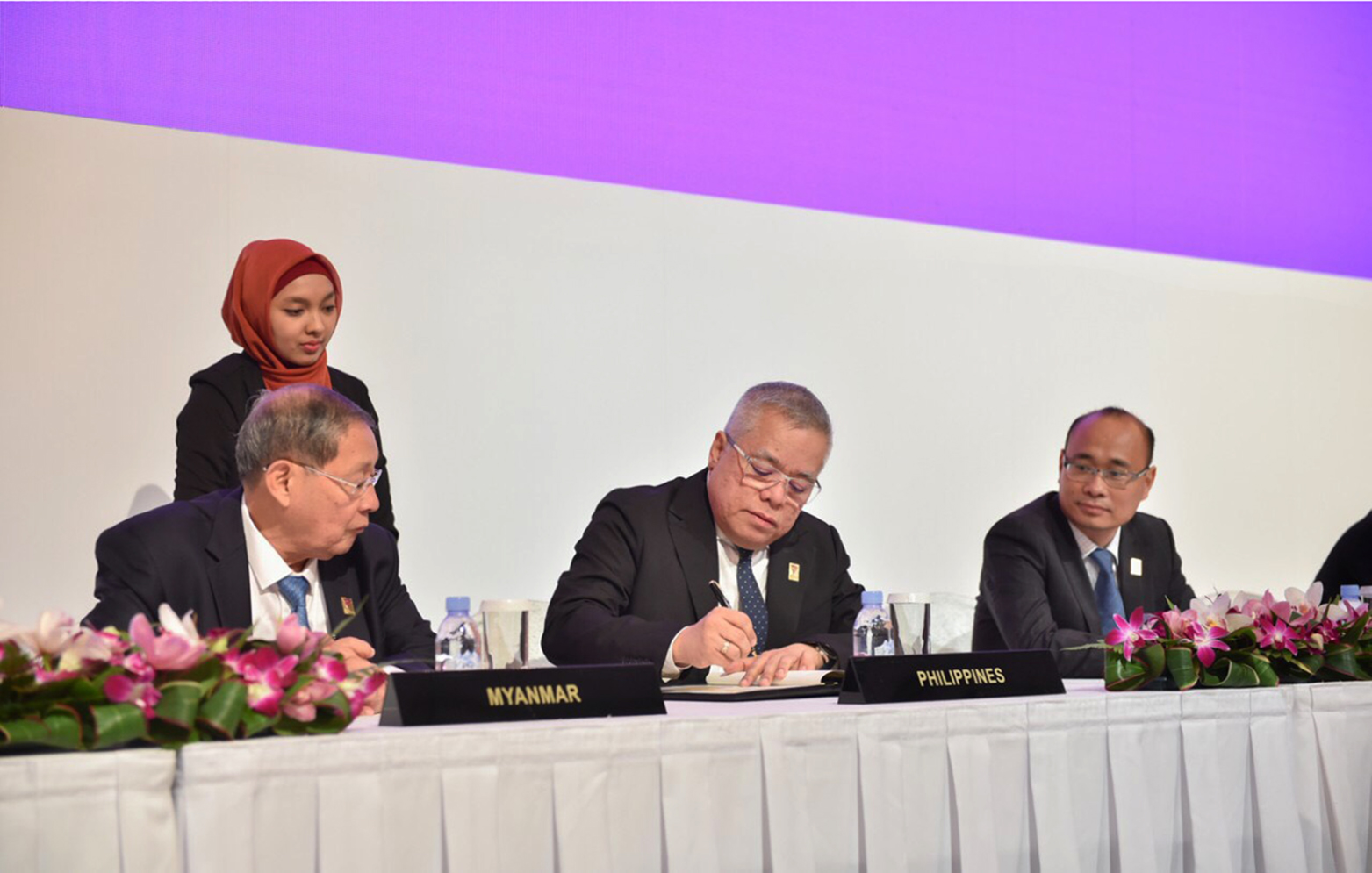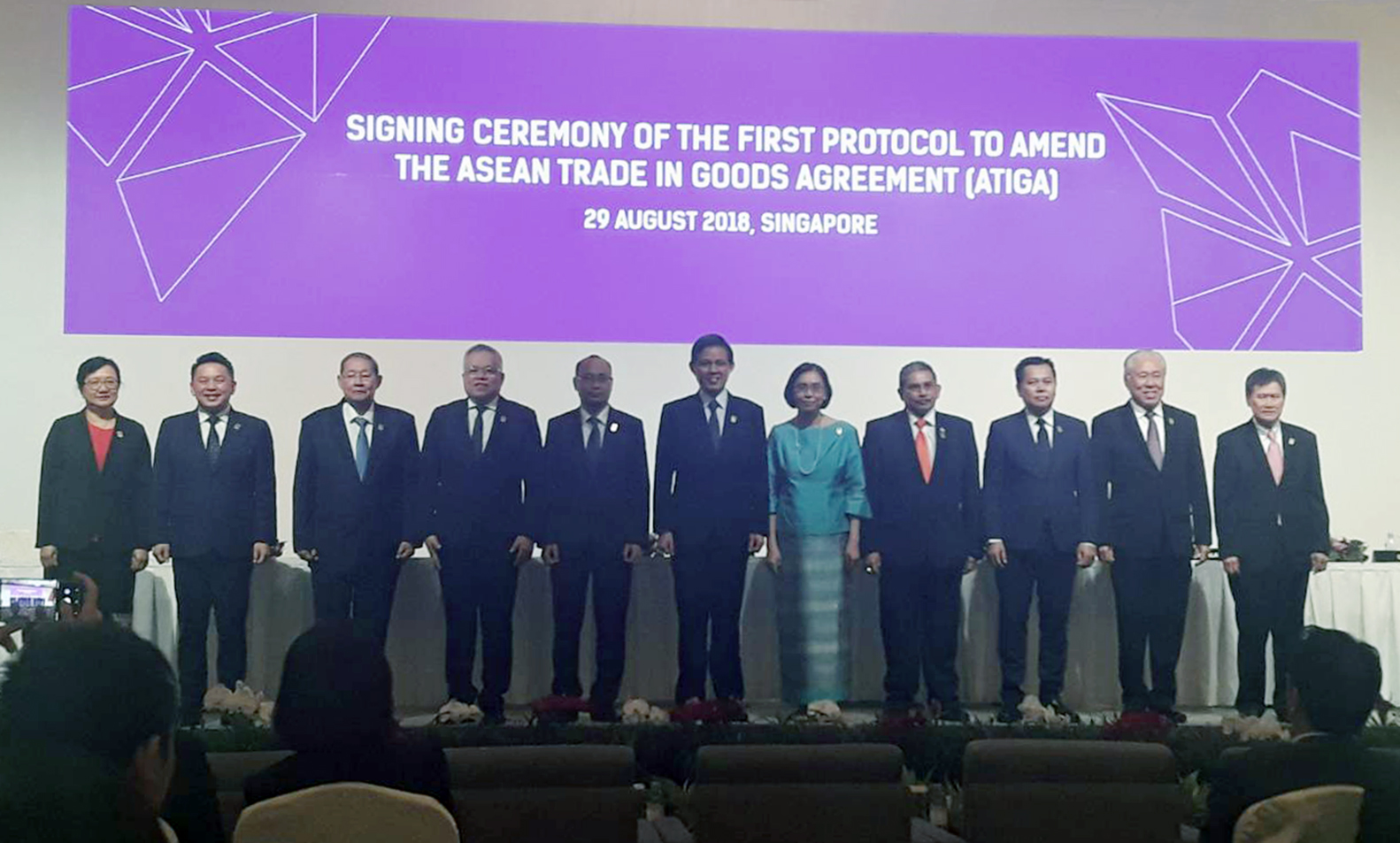SINGAPORE – The ASEAN Economic Ministers (AEM) signed the First Protocol to Amend the ASEAN Trade in Goods Agreement (ATIGA) that will facilitate the implementation of the ASEAN-wide Self-Certification (AWSC) Scheme. This is a simplified and streamlined procedure that will help businesses use the zero tariffs under the free trade agreement (FTA) between ASEAN Member States (AMS).
Likewise, the high-level economic officials signed the Protocol to Implement the 10th Package of Commitments under the ASEAN Framework Agreement on Services (AFAS). This will provide preferential markets for Filipinos engaging in export services such as IT-BPO, tourism, and logistic sectors when doing business across the nine other AMS.
 |
| The signing was held on 29 August 2018 during the 50th AEM Meeting and Related Meetings in Singapore. |
ASEAN Self-Certification is Trade Facilitation
Department of Trade and Industry (DTI) Secretary Ramon M. Lopez, representing the country as the Philippine (PH) AEM Leader, said: “ASEAN is virtually tariff-free, and efforts are now focused on trade facilitation initiatives that will ensure the ease in the flow of goods within the region to complement free trade.”
“The AWSC will minimize burdens associated with administrative compliance and decrease transaction costs. Overall, the scheme is expected to improve the ease of doing business, thereby making it easier for PH companies to use the preferential tariff treatment under the ATIGA,” Sec. Lopez added.
ATIGA has been in place since 2010 and provides for the elimination of import duties for 98.7 percent of the product lines of ASEAN Member States.
Under the AWSC, exporters may apply for Certified Exporter (CE) status and support their claim that their goods are eligible for duty-free tariff under ATIGA. This may be used as an alternative to a Certificate of Origin (CO) Form D. In the current regime, for exported PH goods to enjoy ATIGA benefits, exporters must apply for a CO Form D for every shipment. This must be applied manually and can only be done on regular work days and only during office hours.
The AWSC promotes convenience and leads to cost savings. It also improves distribution timelines as weekend shipments will not be delayed due to administrative limitations of the CO Form applications.
“This will be good for businesses, especially our Micro, Small, and Medium Enterprises (MSMEs). It will make it easier for them to use the FTA, as well as enjoy zero tariffs when they sell to other ASEAN countries,” explained Sec. Lopez.
According to the PH trade chief, the use of FTA will make exports more cost competitive as exporters will no longer have to pay import duties.
The initiative has received positive feedback from the business sector. They also commended the strong push for ease on trade facilitation. AWSC is one of the priority request of the ASEAN Business Advisory Council (ASEAN BAC), which is a new scheme is user-friendly and supports the business models of today.
Under ATIGA, import duties have mostly been brought down to zero percent. But businesses have a hard time accessing this because of complicated procedures.
Certified Exporters can make the claim that their goods meet the requirements of the ATIGA, at their own convenience and exactly when they need it, be it on weekends or on holidays. It does not require repeated applications for CO Form D. It will save time and money.
The Protocol and the ASEAN-wide Self-Certification Scheme is expected to be implemented by all ASEAN Member States by the first semester of 2019. ASEAN is composed of Brunei Darussalam, Cambodia, Indonesia, Lao PDR, Malaysia, Myanmar, the Philippines, Singapore, Thailand, and Vietnam.
“We have this FTA in place and we want our exporters to maximize its use. It will help make our MSMEs more competitive in the global market,” Sec. Lopez noted.
DTI and other government agencies such as the Bureau of Customs and the Tariff Commission will be going around the country to promote and explain what the ATIGA and the AWSC Scheme is all about.
Towards Services Integration
Sec. Lopez also emphasized the importance of trade services in the region following the signing of the 10th AFAS Package.
“We are confident that this package will be a catalyst towards a conducive export environment for service providers and businesses, including our MSMEs,” the PH AEM Leader said.
The AFAS was first signed in December 1995, and it pushed for succeeding liberalization packages as part of efforts to reduce barriers to the service sector in the region.
The latest AFAS Package allows market access and export to a range of new sectors, namely: Communication Services (e.g. export of Filipino soap operas), Health Services (e.g. medical tourism), Distribution Services (e.g. franchising), Education Services, Construction and Related Services, Transport Services, among others. These sectors comprise export interest to PH.
The country’s merchandise trade with ASEAN in 2017 was valued at USD 10 B and accounted for 14.7 percent of total PH exports.
PH’s total services export has also continued to increase in recent years, amounting to USD9.34 B in the first quarter of 2018, an increase of 17.5 percent from USD7.95 B last year.♦
Date of Release: 31 August 2018




